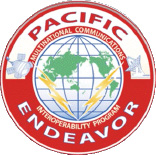I sit down to write this column within days of having returned from a GVF mission to the South Pacific, to Papua New Guinea. There, we – Riaz Lamak, Lead in GVF’s Benchmarking, Validation and High Availabilty Disaster Recovery (HADR) initiatives, and I – were hosted by both the United States Department of Defense Indo-Pacific Command and the PNG Defense Force under the ‘Multinational Communications Interoperability Program’ (MCIP).
Port Moresby, PNG’s capital, was the latest location to hold the annual MCIP event Pacific Endeavor, focusing on disaster response preparation and humanitarian assistance delivery by the military, as first responders, in HADR situations. (First responder communities typically comprise military forces as well as United Nations Agencies and NGOs.)
 The role of satellite communications in HADR is not limited nor confined to news reporting, or to broadcasting appeals for monetary aid. It is an integral and mission-critical foundation to the work of organizing and delivering humanitarian aid and resources, whether in the first 24-48 hour period of a response – supporting supply logistics, providing urgent medical care and coordination of relief efforts – or over the longer-term period of post-disaster recovery and re-building. Satellite communications are key to the success of assistance programs in bringing communications to remote areas – which are so often the most badly affected by disasters – or bringing effective functional communications to replace other communications technologies and platforms that have been rendered ineffective or even destroyed.
The role of satellite communications in HADR is not limited nor confined to news reporting, or to broadcasting appeals for monetary aid. It is an integral and mission-critical foundation to the work of organizing and delivering humanitarian aid and resources, whether in the first 24-48 hour period of a response – supporting supply logistics, providing urgent medical care and coordination of relief efforts – or over the longer-term period of post-disaster recovery and re-building. Satellite communications are key to the success of assistance programs in bringing communications to remote areas – which are so often the most badly affected by disasters – or bringing effective functional communications to replace other communications technologies and platforms that have been rendered ineffective or even destroyed.
I intend to cover details of the 2019 event in a later column, but here I offer an overview of previous Pacific Endeavor programs, those in the event cycle which have featured, within the overall program, a highly detailed “information sharing” track called Satcom Endeavor. These tracks – the most recent featuring in the 2017 Pacific Endeavor held in San Jose, California, and next to feature in the Colombo, Sri Lanka, program in 2020 – are dedicated to extending the understanding of, and broadening the experience of directly using, the latest satellite communications systems and solutions amongst the military first responders of the 27 nations of MCIP.
The Satcom Endeavor element – highly successful in extending the facilitation of collaboration between military first responders and leading providers of satellite communication systems and services – of the Pacific Endeavor 2017 program was a key opportunity for “Senior Communicators” – typically senior ranking officers from army, navy and air force, the key decision-makers from communications and signals divisions, and other officials – from participating nations to experience the latest technological solutions and familiarize themselves with systems, products, and services offered by the satellite industry – specifically GVF Members – thereby enhancing their knowledge and building organizational capacity to strengthen disaster preparedness through the use of space-based broadband solutions.
Pacific Endeavor 2020 will be the next important opportunity for GVF Member organizations to bring their solutions and presentation of example case studies and best practices before the MCIP audience of “Senior Communicators”. The program for Sri Lanka is subject to MCIP decisions at future preparatory meetings prior to the Colombo gathering next August, but the activities which may be proposed by GVF will potentially include a combination of: Hands-on practical sessions & presentation of new technology along with selected unique solutions which are key to HADR preparedness; and, a field-training exercise; together with Mentored online training, and Classroom-based training.
As a result of Riaz Lamak’s efforts directing all previous Satcom Endeavor programs, there is now a rich resource of GVF Training-certified officials in each of the MCIP countries, and MCIP has created a registry of these skilled human resources. This database is available to each of the nations for augmenting their resources and to facilitate quick deployment of disaster relief initiatives.
The mechanism of Pacific Endeavor is just one example of how the GVF’s training resource portfolio and capacity building is addressing the needs of the humanitarian assistance and disaster response community. GVF Training is developing a range of disaster preparedness training courses to enhance its already highly developed catalog of essential satcoms training certification.
These training resources are recognized as the de facto global standard for the humanitarian assistance and disaster response programs of all the United Nations agencies that deliver recovery efforts into the field. Students undertaking these courses learn, practice, and are evaluated on their knowledge and skills with online, self-paced, interactive, simulator driven training modules.
Providing augmented capacity building to the training content – the interactive simulations which are created and administered online by SatProf, Inc. – are classroom sessions with students working on the online courses and mentored on-site by Mahdi Bagh Computers Private Limited (MBC) under the supervision of an instructor or facilitator who can assist with the learning process, and also provide the Hands-on-Skills-Tests (HOST) required for final trainee certification. Further classroom sessions – managed by Riaz Lamak of MBC – provide Advanced Satcoms System Engineering Mentored Classroom Training.
-----------------------------------------------
 Martin Jarrold is Vice-President of International Program Development of GVF. He can be reached at: martin.jarold@gvf.org
Martin Jarrold is Vice-President of International Program Development of GVF. He can be reached at: martin.jarold@gvf.org

